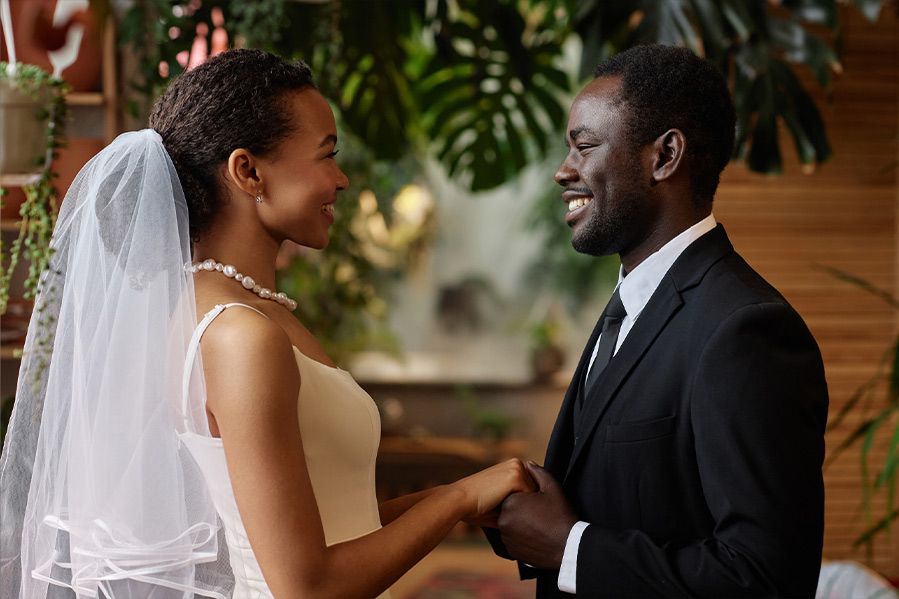
You and the love of your life have decided to “put a ring on it” and share the rest of your lives together as a married couple. The two of you have a unique love story and you envision an unconventional ceremony that reflects your journey. You’ve probably dreamed of a destination wedding with just you and your partner, exchanging vows, and making a lifelong commitment without an officiant or minister. It seems like the wedding of your dreams, but have you considered the million-dollar question: Can you perform your own wedding?
It May Be Possible To Officiate Your Wedding
Unlike the response to a marriage proposal, the answer to this question isn’t a simple yes or no. It depends on where you live and the type of ceremony you’re planning. Generally, two types of ceremonies don’t require an officiant: a civil wedding and a self-uniting marriage. Learn about the legality and the potential issues with self-officiating your wedding.
States Where You Can Officiate Your Own Wedding
Self-uniting marriage or self-solemnization is legal in a few places, including California, Colorado, the District of Columbia, Illinois, Kansas, Maine, Nevada, Pennsylvania, and Wisconsin. Each state has specific provisions and requirements for couples to self-officiate their weddings. It’s important to understand that even in these places there are legal nuances to consider. For example, in Maine, self-solemnization is only available to ordained members of specific faiths. In Wisconsin, self-solemnized marriages may not be recognized in every situation.
Reasons You Might Consider Self-Officiating
Let’s say you live in an area that allows self-uniting marriages. What are some of the potential advantages of going this route?
- Personalizing your event: You can create a ceremony that reflects your unique journey, complete with self-drafted vows and readings that resonate with you and your partner.
- Taking ownership: As the officiant, you’re taking complete ownership of your wedding. You can express commitment in a way that is meaningful and 100% you.
- Creating something intimate and authentic: You’re free to create something true to you and your partner without external opinions or constraints. Self-uniting ceremonies can also be conducive to elopements and nontraditional weddings.
- Saving money: You can eliminate the cost of hiring an officiant, freeing up resources for other aspects such as attire and travel.
While these advantages may be compelling, self-officiating isn't just about legal hurdles. It should be a carefully considered choice that factors in the overall feel and structure of your big day.
Why You Should Have an Officiant
Here are some disadvantages to performing your own wedding:
- Protecting against legal complications: For a marriage to be legal, there are local requirements that a licensed officiant will know. As the officiant, you may not be up on all these regulations which could create a situation where your marriage is not legal, leading to further complications and future challenges.
- Maintaining objectivity: A third-party officiant brings a level of impartiality and an outsider’s perspective that benefits your wedding. This officiant helps to ensure your ceremony is balanced and focuses on the vows and required elements.
- Juggling logistics: Balancing your role as officiant with the enjoyment of your nuptials can be tricky. Can you fully be in the moment as a soon-to-be-newlywed while also making sure the wedding proceeds smoothly?
- Managing emotions: Weddings can be very emotional. Can you manage your feelings while guiding the ceremony effectively? Imagine being so overcome with emotion that you forget to declare your intent or pronounce you and your partner as married.
- Managing others’ expectations: You may want to include loved ones who may not be on board with a self-officiated ceremony. A hired officiant can help facilitate communication and set clear expectations with everyone involved.
Ordination Matters
The decision to self-officiate will be based on personal preferences, comfort, and legal feasibility. The good news is that you can still have the wedding of your dreams with an officiant, especially one that is ordained by the Universal Life Church. A ULC-ordained minister can help you create a tailored ceremony that reflects you and your partner’s unique journey to marriage. From developing a wedding script to helping write vows to managing marriage certificate requirements, your officiant guides you through the entire process, making sure your ceremony is complete, completely yours, and completely legal.



